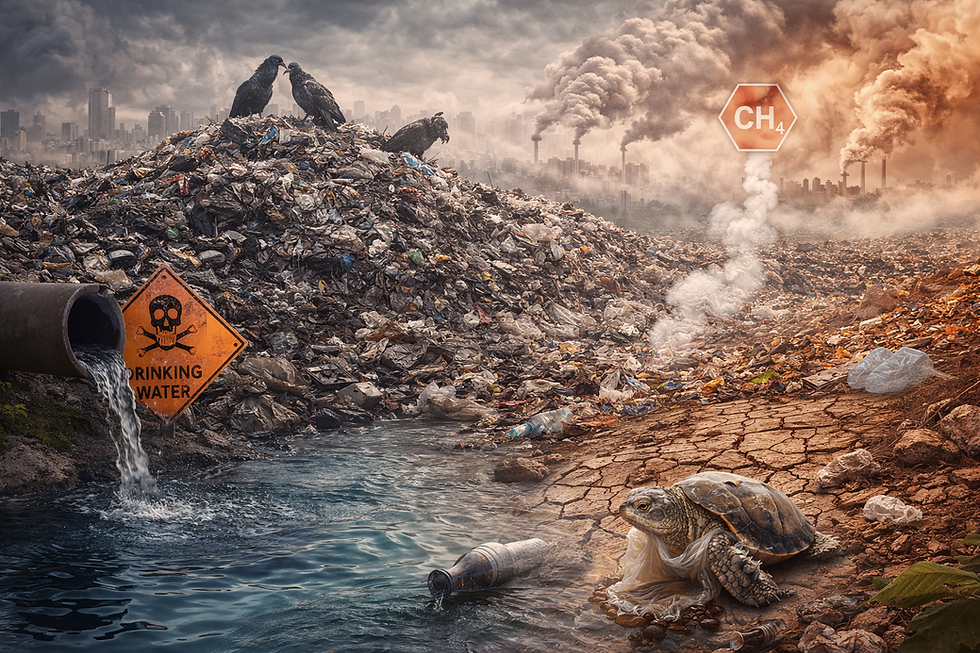How Are Landfills Affecting the Environment?
- ierminstituteseo
- May 12, 2025
- 3 min read
Landfills are an essential part of modern waste management, but their impact on the environment is a growing concern. As cities expand and consumption increases, the volume of waste being dumped into landfills continues to rise. While landfills help manage waste temporarily, they pose serious environmental challenges that cannot be ignored. In this article, we will explore how landfills affect the environment, the long-term consequences, and possible sustainable solutions.

1. Soil and Water Contamination
One of the most harmful effects of landfills is soil and groundwater contamination. When waste decomposes, it produces a toxic liquid called leachate. This leachate often contains dangerous chemicals, heavy metals, and biological pollutants. If a landfill is not properly lined or maintained, this toxic fluid can seep into the ground and contaminate local water supplies.
Contaminated groundwater affects not only humans but also wildlife and agriculture. In rural areas, people who depend on well water may unknowingly consume polluted water, leading to serious health issues.
2. Air Pollution and Greenhouse Gases
Landfills are a major source of air pollution, particularly methane gas, which is released during the decomposition of organic waste. Methane is a potent greenhouse gas, around 25 times more effective than carbon dioxide at trapping heat in the atmosphere.
This makes landfills significant contributors to climate change. Besides methane, landfills also emit unpleasant odors and toxic gases like ammonia and hydrogen sulfide, which affect air quality and can lead to respiratory problems for nearby communities.
3. Threat to Wildlife and Biodiversity
Landfills disturb natural habitats and threaten local wildlife. Birds, rodents, and stray animals often scavenge landfill sites, exposing themselves to hazardous waste, plastics, and chemicals. This leads to poisoning, injuries, and even death.
In addition, the expansion of landfills means the destruction of forests and wetlands, resulting in loss of biodiversity. These changes affect the ecological balance and reduce the population of native species.
4. Waste of Natural Resources
Many items dumped into landfills could be reused or recycled. Paper, plastic, glass, and metals often end up in landfills instead of being recovered. This leads to a waste of natural resources and increases the demand for new raw materials, which causes further environmental degradation through mining, deforestation, and water use.
Promoting recycling and composting can significantly reduce the amount of waste going to landfills and conserve resources.
5. Land Use and Visual Pollution
Landfills occupy large areas of land that could be used for farming, housing, or green spaces. As urban areas grow, finding new landfill locations becomes increasingly difficult. Moreover, landfills are unsightly and create visual pollution, affecting the beauty of natural landscapes and reducing property values in nearby areas.
Sustainable Solutions
To reduce the environmental impact of landfills, several strategies can be adopted:
Waste segregation at the source: Separating dry, wet, and hazardous waste helps in better recycling and disposal.
Recycling programs: Encouraging recycling reduces landfill waste and saves energy.
Composting: Organic waste can be composted to produce natural fertilizer.
Modern landfill technology: Using liners, leachate collection systems, and methane recovery can reduce pollution.
Public awareness campaigns: Educating people about waste reduction and responsible disposal can lead to long-term change.
Conclusion
Landfills may seem like an easy solution to manage waste, but their environmental consequences are far-reaching. From polluting soil and water to contributing to climate change, landfills are damaging the Earth’s natural systems. By adopting eco-friendly habits, supporting recycling, and pushing for better waste management policies, we can reduce our dependence on landfills and move toward a cleaner, greener future.



Comments